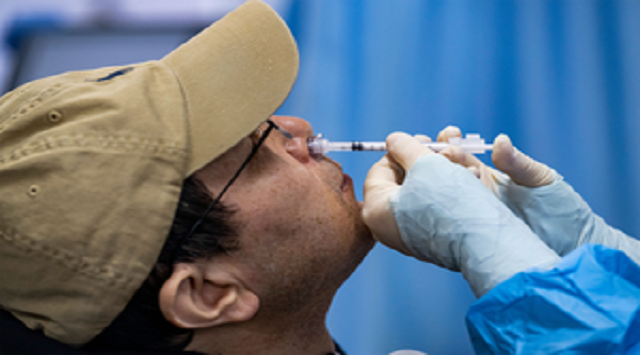New nasal Covid vax candidate offers better, longer protection against SARS-CoV-2
Team of US scientists has discovered a potential intranasal vaccine candidate that provides improved, longer-lasting immunity against Covid
New York: A team of US scientists has discovered a potential intranasal vaccine candidate that provides improved, longer-lasting immunity against SARS-CoV-2 viruses compared to when given as an injection.
By triggering an immune response directly at the point of entry, the intranasal vaccine candidate enhanced long-term immune memory of the virus, which could translate to a reduced need for booster shots.
There is growing evidence that intranasal vaccines provide greater protection at mucosal surfaces, making this a vaccination route that could reduce breakthrough infections and subsequent transmission of the virus.
Published in the journal eBioMedicine, the findings showed nasal administration of the vaccine candidate boosted mucosal antibody response, as expected.
Additionally, and more importantly, it enhanced longer-lasting mucosal and systemic immune protection through preferential induction of airway-resident T cells and central memory T cells.
“Our data show that, compared to subcutaneous vaccination, the intranasal route improved the response of certain immune cells, known as T cells, which reduced disease severity,” explained lead author Ashley St John, Associate Professor at Duke-NUS’ Emerging Infectious Diseases Programme.
“Not only that, but it also resulted in a greater number of T central memory cells compared to subcutaneous vaccination, which could lead to longer-lasting protection.”
T central memory cells play a vital role in safeguarding the body upon re-exposure to a virus. They enhance the immune system’s memory, inducing long-lasting protective immune responses. This ability to retain this long-term memory of the virus suggests less need for a pathogen challenge to achieve the same level of protection against the virus, potentially translating into fewer boosters.
The research team also found that the use of adjuvants in the vaccine to promote immune response influenced the characteristics of T-cells, as well as their activation and production of cytokines tiny proteins that regulate cell communication and control inflammation with different adjuvants leading to different T-cell responses.
“While the acute phase of the pandemic may be behind us, the rise of new variants, including JN.1, which has triggered an increase in hospital admissions locally, demonstrates that we have room in our arsenal of vaccines and treatments for even better tools. This study shows that mucosal vaccination holds promise for improving Covid-19 vaccine efficacy with potentially fewer boosters needed,” said Professor Patrick Tan, Senior Vice-Dean for Research at Duke-NUS.




 Ms Kalinga
Ms Kalinga